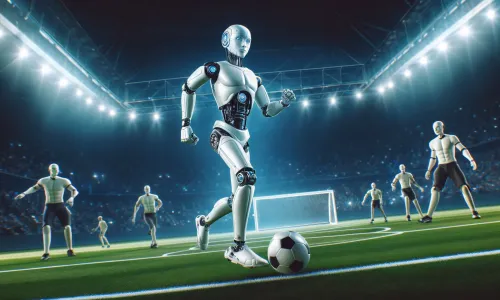
A. The first sports game was televised in the USA more than fifty years ago. Over the following decades television provided sports coaches with a wealth of information to analyse. By viewing recordings, they could study the number of passes received, tackles avoided, distances covered, speeds achieved and a host of other factors relating to the performance of their teams or athletes. Most of this data, though, consisted of bare statistics without any meaningful context. However, the use of artificial intelligence (AI) is now enabling an alternative approach to coaching. AI means the development of computer systems that can perform tasks usually associated with human intelligence, such as decision making. Increasingly, computers are being trained to understand the rules and objectives of sports so they can coach more directly. AI can analyse not only a player's actions, but also relate those actions to the wider context, including the directives of the coach and the actions of other players. Sports scientists believe that AI is revolutionising sports coaching by analysing patterns of behaviour in ways simply not possible before.
B. There may be limitless ways in which AI technology can be developed, but certain practical applications are already apparent. Recently, a research experiment was conducted into the Spanish football league using an AI algorithm to analyse the passing strategies of 20 teams. The research revealed that two teams, Barcelona and Real Madrid, had more than 150 recurring passing patterns. However, the algorithm detected just 31 passing patterns used by Atletico Madrid. All of Atletico's other plays were one-offs that were never repeated, and the team won the league that season. One conclusion seems to be that teams with a less predictable style of play win more games. What's more, according to Dr Johann Muller, a sports scientist who has studied the Spanish research findings, the number of injuries a team suffers increases when they play in a style that prioritises offence.
C. Since then, there has been a great deal of interest in the potential of AI. Professor of sports education Rebecca Graves believes that AI can provide coaches with invaluable insights. 'Tactics were once closely guarded secrets,' says Professor Graves, 'but now a coach with access to AI can identify how a rival team is likely to play a match based on historic form. Once this was largely guesswork but now it can be achieved with some confidence.' The expense of AI technology means it will probably remain beyond the reach of all but elite teams, but among this group the implications are enormous. Professor Graves argues that AI allows preparations for a match to be tailored to individual players with much greater precision. She identifies fitness work, skills development, diet and numerous other factors that can be minutely customised, based on an individual's particular strengths and weaknesses.
D. Part of the appeal of AI lies in its versatility. Ice hockey coaches in Finland are using AI to analyse the success of different plays. An Indian company has employed wearable technology developed in other fields to analyse stride patterns. This analysis has allowed its technicians to develop sneakers in various styles aimed at both long and short distance runners. Coaching practices in professional basketball, American football and tennis are also being transformed by AI. In addition, the technology has applications in highly technical sports such as car racing. Coaches involved in the National Association for Stock Car Auto Racing (NASCAR) believe that AI algorithms not only help drivers go faster but also enhance the safety of the sport because of their ability to monitor and predict potential problems.
E. AI doesn't get tired, has extraordinary powers of vision, particularly for objects moving at speed, and is capable of making complex calculations very quickly. For all these reasons AI is increasingly being used in the high-pressure world of judging gymnastics performances. Research has shown that, particularly over a whole day's worth of events, computers are just as reliable as human judges when it comes to giving gymnasts a score. However, computer scientist Henri Simeonson has been quick to warn about some potential difficulties. In particular, Simeonson is concerned that AI is vulnerable to hackers, who might be able to influence the outcome of a tournament.
F. It should not be forgotten, either, that many sports stars and sports teams are commercially dependent on their fans. If sufficient supporters do not buy tickets to games or pay to view a recording, the teams might struggle to survive. But now teams and stars are making increasing use of chatbots and other 'virtual assistants' to provide fans with statistics, news and background information about their favourite players. Another innovation is seen in Minor League Baseball in the USA, which is promoting the sport and seeking new fans with the use of AI-enhanced journalism. In this way baseball is keeping supporters informed with all the up-to-the-minute developments in ways not possible with more traditional approaches. Analysts believe these sorts of initiatives are crucial to increasing a player or team's revenue stream. It's just one more way that sports stand to benefit from AI technologies, on and off the field.